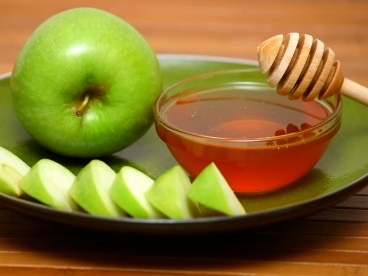
reference-image, l
(article, Leah Koenig)
From Halloween to New Year’s Eve, holidays are going green — especially with locally-inspired meals. [[block(sidebar). h1.Featured recipe]] Rosh Hashanah, the Jewish new year, falls at one of the most delicious intersections of the growing season, when the last of summer’s tomatoes and eggplants mingle with the first of autumn’s squash and root vegetables. Maximize the season’s freshness with these tips for a sustainable holiday feast. [[list(culinate8). #(clear n1). [%image reference-image float='clear right' width=350 caption="Apple slices and honey are a classic Rosh Hashanah treat."]Pick your own apples. Dipping apples into honey to symbolize the sweet year to come is one of Rosh Hashanah’s tastiest traditions. Bring a bit of farm freshness to this upcoming holiday by scheduling an apple-picking day at a nearby farm. As you dip at the dinner table, share the apple farmer’s story with guests. (Find a farm near you at Pick Your Own.) #(clear n2). Avoid the honey bear. The emergence of “colony collapse disorder” (aka the mass disappearance of honey bees from their hives) indicates that something is awry in the bee universe. Meanwhile, the ubiquitous honey bear that sits in most of our cabinets (and yes, is near and dear to many of our hearts) tends to be filled with industrially produced — and not particularly flavorful — honey. This year, dip your apples in delicious, raw honey produced by a small-scale apiary that supports healthy bees. Or try a honey substitute like agave nectar, maple syrup, or homemade preserves — anything delicious and sweet. #(clear n3). Drink kosher organic wine. Kosher organic wine is no longer an oxymoron, as more and more kosher wineries go green. And the list just got a whole lot longer since Baron Herzog started using “sustainable” growing practices. So impress your friends as the world’s best sustainable sommelier by serving them wines that are tasty, kosher, and good for the Earth. #(clear n4). Blend the traditional with the local. People crave familiar foods at holiday times. But it's all too easy to fall into a culinary rut — and besides, those old standbys don't always lend themselves to good health or sustainability. This year, add a dash of innovation to traditional Jewish holiday dishes by incorporating local flavors into your favorite family recipes. Try spicing up challah with apple cider and dried apple pieces, slip pieces of acorn squash into kugel, or pair warm barley with apple, spinach, and sharp feta cheese. #(clear n5). Rethink chicken soup. Chicken soup is an iconic Jewish comfort food, but you may want to skip it if you're trying to cut back on your meat consumption. Treat your guests instead to a seasonal, vegetable-based soup like Leek and Delicata Squash Soup with Caramelized Apple Croutons. If you really need that tureen of soup on your table, look for kosher organic chicken — and consider making the soup the only meat in your meal. #(clear n6). Sustainable decor. Fresh-cut flowers add elegance to any table, but they invariably wilt and need to be thrown away after a few days. Instead, create a centerpiece that will impress your guests with its sustainability as well as its style. Place 12 heirloom apples or pomegranates in a glass bowl in the center of the table for a stunning, natural effect. Or decorate your table with potted fall flowers and gourds to add seasonal color. At the end of dinner, invite your guests to take home the fruit, squash, or potted plants as a parting gift. #(clear n7). Food for thought. There's an old Jewish saying that if three people have eaten together at one table and not discussed words of the Torah, the meal was essentially wasted. This year, ask your guests to bring a favorite song, poem, scene from a play, or other text based around a particular Rosh Hashanah theme. Need examples? Try “returning,” “scarcity and abundance,” or “mindful eating.” At dinner, ask your guests to share what they brought, then let the conversation flow. #(clear n8). Wrap things up with fair-trade treats. What winter holiday meal doesn’t end with a hot cup of coffee or tea? This year, end your Rosh Hashanah dinner with fair-trade coffee, tea, and chocolate from Equal Exchange. ]] p(bio). Leah Koenig is a freelance writer based in Brooklyn and the editor of The Jew and The Carrot, Hazon’s blog on Jews, food, and sustainability.

reference-image, l